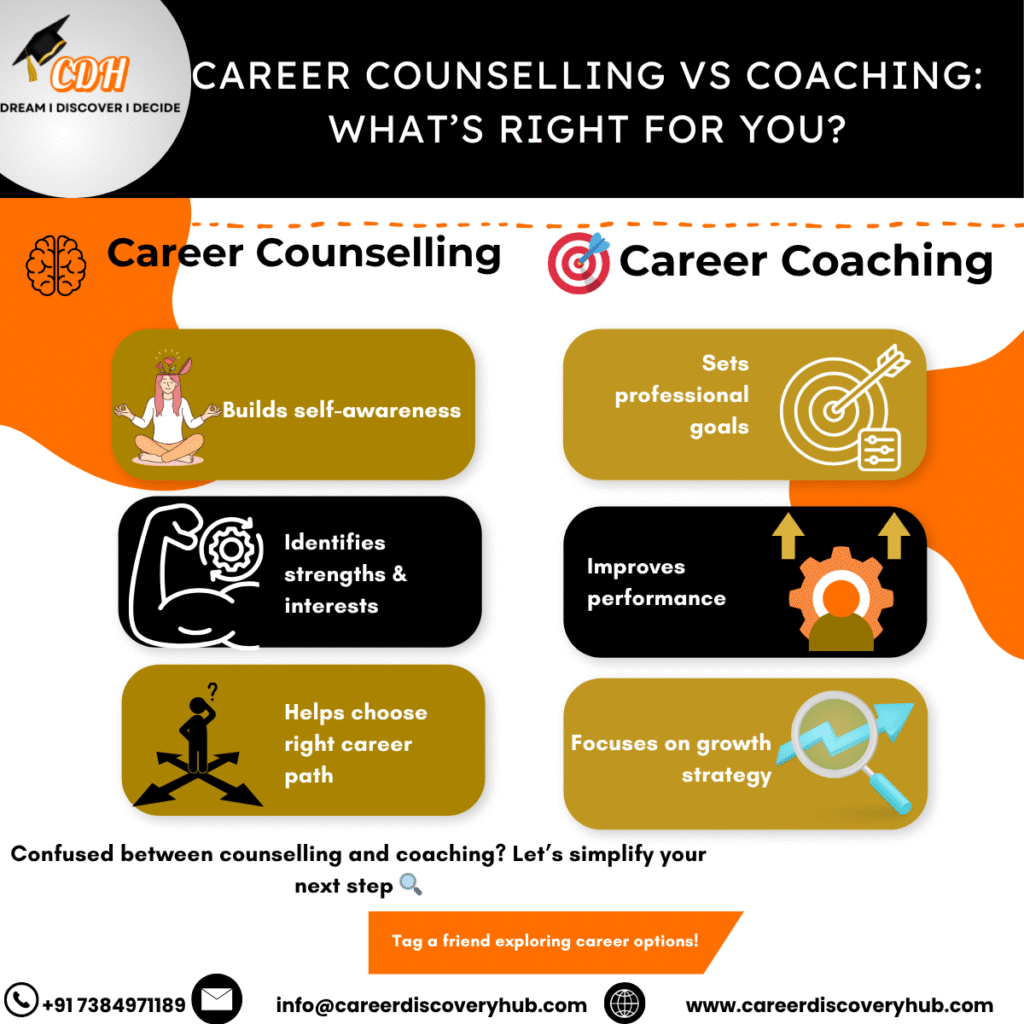Career Counselling vs Coaching: What’s Right for You?
Choosing the right career path or advancing in your profession are major decisions. Two support options often come into play: career counselling and career coaching. Though these terms are sometimes used interchangeably, they serve different purposes, use different approaches and are best suited at different stages of your career. Understanding the difference will help you select the right support for your needs — and get the best results.
What is Career Counselling?
Career counselling is a process focused on understanding yourself — your interests, values, personality, aptitudes and how they align with career options. A counsellor typically uses tools such as psychometric tests, interest inventories, aptitude assessments and structured interviews to guide you. The goal is to provide clarity, explore possibilities and help you make decisions about education, training or career direction.
This is especially useful when you feel uncertain: you’re a student who isn’t sure what to study, a professional wondering whether to switch fields, or someone who senses that your career isn’t aligned with who you are. The counsellor may dig into your past experiences, your mindset, beliefs, fears and motivations — all to help you uncover what barrier or confusion might be holding you back.
In short, counselling is exploratory, diagnostic and inward-focused. It helps you build the foundation: who am I? What can I do? What would suit me? And what kind of work would bring me satisfaction and success?

Career counsellor guiding a student about study abroad options
What is Career Coaching?
Career coaching, in contrast, is much more action-oriented and future-focused. Once you know the kind of path you want (or at least have a direction), coaching helps you execute: setting goals, drawing up strategies, developing skills, staying accountable and making progress. A coach works with you to design your plan, track your milestones, hone your performance and navigate practical transitions such as job search, promotion, career shifts, networking and personal branding.
Coaching is ideal when you know where you want to go, but need help to get moving and stay on track. It tends to use structured frameworks, goal-setting models, performance tracking, motivation, feedback and accountability.
In essence, coaching answers the question: “I already know my direction — now help me get there.

Career coach helping a professional plan goals
Key Differences: Counselling vs Coaching
Understanding the differences helps you choose the right service at the right time. Here are key distinctions:
1. Purpose & Focus
- Counselling focuses on self-awareness, choice, exploration of options and overcoming internal barriers.
- Coaching focuses on planning, execution, goal achievement, skill development and momentum.
2. When It’s Needed
- If you feel lost, unsure about which career to pick, stuck with confusion or working through career identity — you likely need counselling.
- If you have a goal, but struggle to move ahead, need structure, strategy or accountability — you likely need coaching.
3. Methods & Tools
- Counsellors deploy assessments: personality/interest tests, values profiling, decision trees, reflection worksheets. They create space to explore, reflect and align.
- Coaches deploy frameworks: SMART goals, GROW model, action plans, progress reviews, skills analytics, real-world assignments and accountability check-ins.
4. Duration & Engagement
- Counselling is often shorter: a few sessions to gain clarity and direction. It may be episodic — as you make decisions.
- Coaching is typically longer-term: a partnership spanning multiple weeks or months to implement change, hone new habits, achieve milestones and measure outcomes.

which is better career counselling or coaching
5. Credentials & Background
- Career counsellors often hold degrees in psychology, counselling or vocational guidance. Their work may involve psychological assessment and therapeutic thinking.
- Career coaches may come from business backgrounds, leadership development or coaching certification programmes. Their role is less therapeutic and more performance-driven.
How to Choose: Which One Fits You Right Now?
If you’re standing at a crossroads, ask yourself these questions:
- Do I feel confused about which path to choose?
- Am I struggling to identify what I really want or what fits me?
- Do I sense personal doubts, internal blocks or indecision?
If you answered “yes” to any of these — counselling may be what you need.
Alternatively:
- Do I already know what field I want, but don’t know how to start?
- Am I struggling to move ahead, build a plan, develop required skills or stay motivated?
- Do I need support with job search, promotion strategy, career transition or performance improvement?
If so — coaching is likely the better fit.
Many high-performing professionals actually use both: counselling during their early decision phase, coaching when they need to accelerate or shift career trajectory.
Example Scenario: Student vs Working Professional
Student scenario: A final-year college student uncertain whether to study engineering, commerce or design. They don’t know what they like or what fits them. Here counselling helps: aptitude tests, exploring strengths, mapping career streams, clarifying interests.
Working professional scenario: A mid-career professional knows they want to move into management, or shift into product roles, or even start their own venture. They have skills but need strategy, branding, interview prep, leadership development. Here coaching helps: goal-setting, action planning, networking strategy, skill-upgrade roadmap.
Costs, Benefits & Outcomes
Counselling offers value by bringing clarity, reducing uncertainty, aligning you with options. It often engages fewer sessions and is less intensive. The outcome: a clear path forward.
Coaching offers value by driving action, building momentum, developing new capacity and keeping you accountable. The outcome: measurable progress, skill improvement, transition success.
However, coaching may require a greater commitment of time, resources and effort since you’re not just thinking but doing.
When Should You Move from Counselling to Coaching?
Often the ideal sequence is:
- Clarity first (Counselling): Understand yourself, evaluate options, choose your path.
- Action next (Coaching): Once you have direction, work with a coach to develop strategy, set goals, build skills, sustain growth and achieve milestones.
Skipping straight to coaching without clear direction can lead to unfocused efforts. Equally, using counselling alone may leave you with clarity but no momentum. The two complement each other.
How to Get the Most from Either Process
- Be honest with yourself: share your fears, uncertainties, ambitions and what you really want.
- Commit to the process: whether it’s assessments in counselling or homework in coaching — your effort matters.
- Set realistic goals: For coaching, commit to action steps and deadlines. For counselling, commit to self‐reflection.
- Review progress: Track your decision (post-counselling) or milestone completion (in coaching).
- Choose the right professional: Check their credentials, approach, reviews & methodology. Speak with them to ensure they align with your style and needs.
Blog by Hanumanth Rao